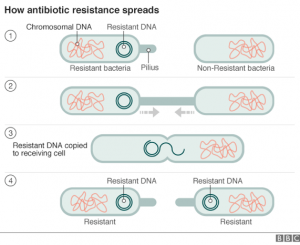Antibiotics controversies
In North America, about 23,000 deaths are reported every year due to superbug infections (antibiotic resistant infections). Antibiotics are given as drugs to treat bacterial infections. When the bacteria become resistant to three or more types of antibiotics, they lead to the rise of superbugs (Consumer Reports, 2015). Many factors can contribute to the cause of these antibiotic resistant superbug infections, one of which is the abuse of antibiotics in animal farm practices. Consumer Reports did a 3-year investigation on raw meat products revealing superbugs present in four major types of raw meat: turkey, chicken, beef, and shrimp. Samples taken in for testing showed superbugs present in: 84% of turkey samples, 57% of chicken samples, and 14% for both beef and shrimp samples (Consumer Reports, 2015). There may be a big gap between certain meat types, but this study was done over three years, and the sample size ranged from 168 to 304. As it is shown above, the presence of superbugs in raw products indirectly proves the overuse of antibiotics in animal farm, which leads to the death of superbug infected patients.
On the other hand, according to the Consumer Reports, the meat and poultry industries claim that drugs (antibiotics) were not widely overused and the use of drugs are important to ensure animal’s health, welfare and food safety to a certain extent. However, the science behind it suggests otherwise.
How does antibiotic resistant occur?
DNA mutations often occur naturally in bacteria, but when a gene that is responsible for the bacterium’s survival is mutated, antibiotic resistance may appear. Antibiotic resistance happens when a pathogen manages to escape from being killed by antibiotics and therefore, is able replicate in numbers. However, it does not need a daily routine of antibiotic applications to encourage superbugs to flourish as there is also another mechanism in promoting the multiplication. Gene transfer is a common mechanism that happens as a DNA of an organism is passed onto another organism that is nearby; consequently, infecting neighboring organisms.

image: http://www.bbc.com/news/health-34857015
Will it cause extreme harm?
No, as long as you cook the meat to the appropriate temperature, harmful pathogens should not be able to survive and infect us. However, if we do get superbug infections from eating meat that were not cooked properly, it would become a life-threatening situation since superbugs are resistant to all known antibiotics. If there are people who are very concerned with superbugs in the meat, switching to meat products that are labeled “Organic” or “No Antibiotics” will minimize the chances of superbug exposures.
References:
Main article for this blog: British Columbia,. (2015). Superbugs found in a lot of meat, chicken and fish. Retrieved 5 December 2015, from http://bc.ctvnews.ca/superbugs-found-in-a-lot-of-meat-chicken-and-fish-1.2663299
Consumerreports.org,. (2015). Making The World Safe From Superbugs – Consumer Reports. Retrieved 5 December 2015, from http://www.consumerreports.org/cro/health/making-the-world-safe-from-superbugs/index.htm?utm_source=hootsuite

6 responses to ““MEAT” Superbugs”